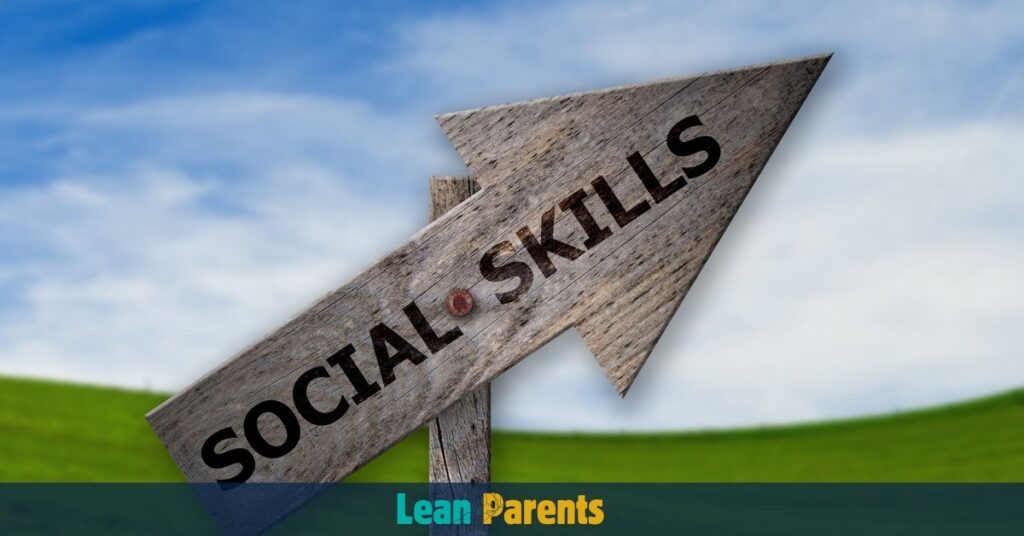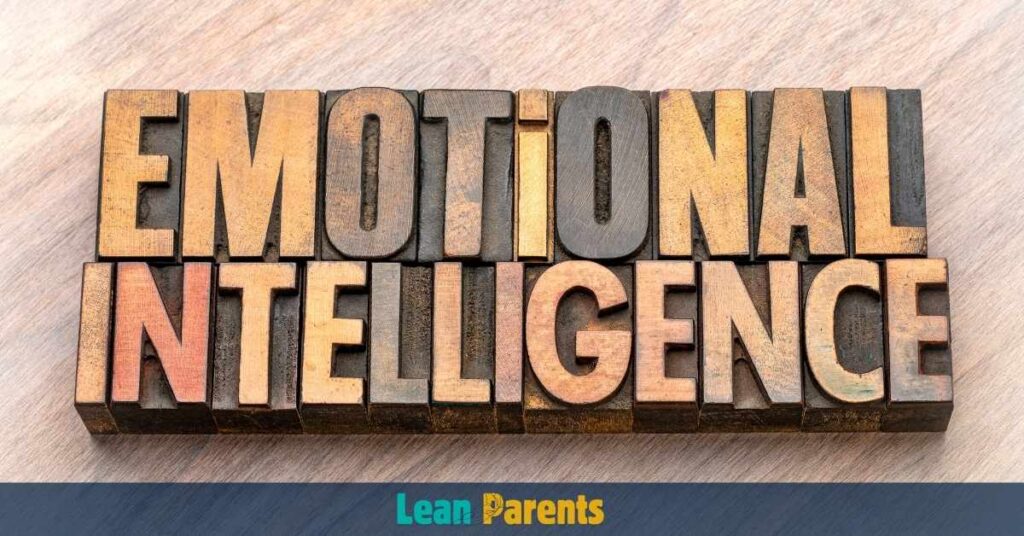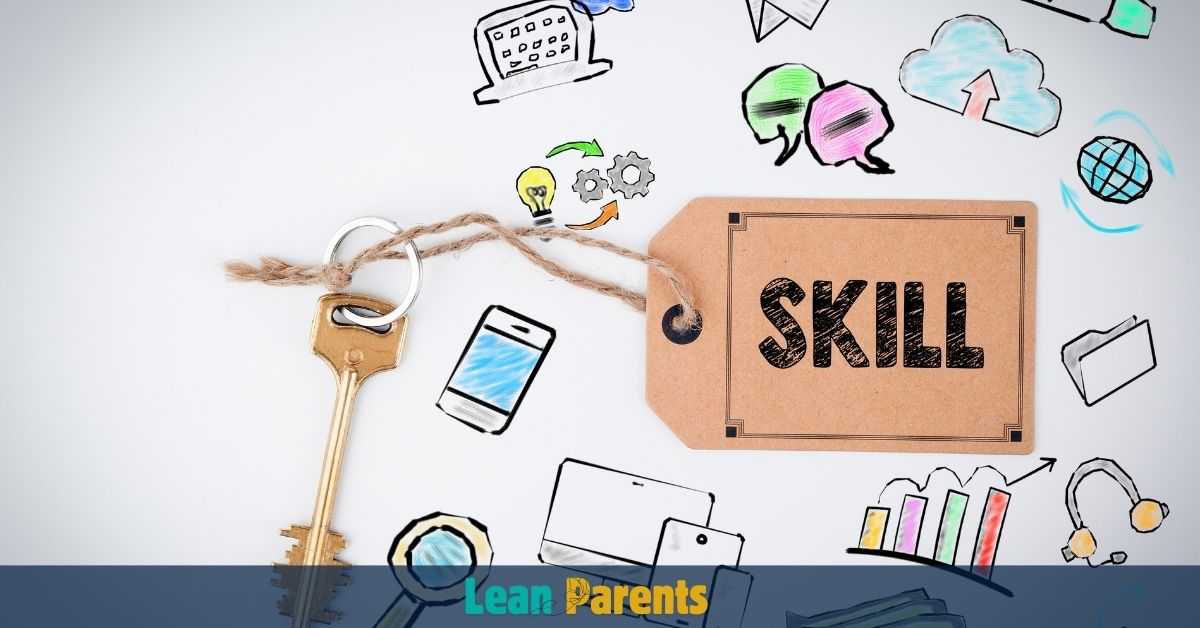I remember the first day of school vividly. The excitement and nerves were palpable. It was a moment that made me realize one crucial truth: social skills are key to a child’s success, just as much as academics.
Research shows that social skills like cooperation and self-control are key at the start of school1. Teachers focus on building a child’s confidence early on1. Games and stories help kids learn to work together and empathize with others1.
Encouraging a love for learning is crucial, especially in the early years1. Good communication skills are essential for reading, writing, and other subjects1. Children who struggle to make friends often find close bonds at home, which helps in school1.
As a parent, I’ve seen how vital social skills are for a child’s success. By focusing on these skills, we can help our kids excel in school and life.
Key Takeaways
- Social skills like cooperation, self-control, confidence, and communication are crucial for school success.
- Developing a child’s sense of self-esteem and curiosity helps them feel competent and engaged in learning.
- Social skills like empathy and cooperation enable children to build positive relationships with peers and teachers.
- Strong social-emotional skills lead to better academic performance, mental health, and future life outcomes.
- Nurturing social skills from an early age sets children up for lifelong success.
Understanding the Foundation of School Success
Early childhood education is key for a child’s social-emotional growth. It prepares them for school success and good classroom relationships2. Important skills include cooperation, self-control, and confidence. Also, independence, curiosity, empathy, and communication skills are crucial2.
Social-Emotional Learning (SEL) programs help kids understand their feelings. They become more aware of themselves and develop empathy for others2. The Collaborative for Academic, Social, and Emotional Learning (CASEL) says SEL has five main areas: recognizing emotions, self-regulation, empathy, relationship skills, and responsible decision-making2. Kids in SEL programs see an 11 percentile boost in grades and better attendance2.
The Role of Early Social Development
Experts say social skills should be the main focus for young children, especially those with disabilities3. Direct techniques can help kids with problem behaviors. Play can improve social skills for those who are isolated3. As kids move through play stages, they learn a lot about social skills3.
Building Blocks of Academic Achievement
Social-emotional skills like problem-solving and self-regulation help students focus and make good choices4. These skills make them supportive members of their community4. Studies show that social-emotional education improves grades, graduation rates, and overall life quality4.
Creating Positive Learning Environments
Effective SEL programs give teachers tools to help students manage their emotions4. Teachers can use classroom activities and everyday moments to teach social skills3. This leads to kids being more involved in social interactions3.
“Social-emotional skills like relationship-building, problem-solving, and collaboration are highly sought after in today’s workforce.”4
Early childhood education is vital for a child’s social-emotional growth. This growth is the base for academic success and positive learning environments. By focusing on these skills, educators and parents can help children succeed in school and life. Encouraging conflict resolution in children is a key part of this process.
Social Skills are Key to School Success

Strong social skills are crucial for a child’s success in school. Studies show that learning social and emotional skills can boost a student’s grades by 11 percentile points5. Skills like self-control, assertiveness, and resilience help kids do well in school and focus better.
Social skills are vital for a good learning environment. Kids who can wait, share, and be polite do better in school5. Good communication skills help students share their thoughts and feelings, making learning more engaging6. When students feel respected, the classroom becomes a better place for learning.
Social skills also help kids make friends and stay happy. Young students with good self-esteem and confidence can handle bullies and anxiety better5. Teaching these skills helps kids succeed in school and later in life.
In summary, teaching social skills is important for school success. It helps kids do well in school, make friends, and prepare for the future. By focusing on social-emotional learning, we can help students grow both academically and personally.
The Four Cs: Core Social Competencies
Success in school and beyond is not just about grades. It also depends on social skills like confidence and self-esteem, cooperation and teamwork, curiosity and lifelong learning drive, and effective communication skills. These skills are key for a child’s success in school and personal growth7.
Confidence and Self-Esteem
Feeling confident and having high self-esteem is crucial for kids in school. When they believe in themselves, they’re more likely to try new things and learn from mistakes. Building confidence and self-esteem helps them handle school challenges better78.
Cooperation and Teamwork
Working well with others is important for school success. Teamwork activities help kids learn to work together, share, and solve problems. These skills not only help in school but also in the future workplace78.
Curiosity and Learning Drive
Being curious and eager to learn is a big plus for students. When kids are curious, they stay engaged and motivated. Encouraging their curiosity helps them grow and learn for life79.
Communication Skills
Being able to communicate well is key for school success. Students who can express their thoughts clearly and listen well do better in class. They can share their ideas and fully participate in learning789.
| Core Social Competency | Key Skills Involved |
|---|---|
| Confidence and Self-Esteem | Feeling good about abilities, taking risks, persistence, resilience |
| Cooperation and Teamwork | Empathy, communication, problem-solving, resource sharing, compromise |
| Curiosity and Learning Drive | Inquisitiveness, engagement, motivation, embracing challenges |
| Communication Skills | Articulating ideas, active listening, adapting style, participating, conveying knowledge |
By focusing on these social skills, schools and families can help kids succeed in school and beyond. These skills are essential for success in today’s world789.
Emotional Intelligence in the Classroom

Emotional intelligence is key in school. It helps students manage their feelings, understand others, and get along well. Studies show it’s linked to better grades10. Learning to manage emotions and empathize can really help students do well in school10.
Teaching emotional intelligence boosts students’ happiness and success. It’s more than just grades. It helps students grow and do well in life11. Teachers can make a big difference by teaching these important skills11.
Knowing and controlling emotions is at the heart of emotional intelligence. It’s a key to success11. Teachers can learn to teach these skills to their students11.
Emotional intelligence is very important in school. It helps students manage their feelings and do well11. Students who are emotionally smart do better in school and handle challenges well11.
Social-emotional learning (SEL) is vital in schools. It helps students understand and manage their feelings. It also helps them get along with others and make good choices11. SEL programs improve grades and help students feel better about themselves11.
By teaching emotional intelligence in school, students become stronger and more confident. They learn to empathize and handle challenges11. This helps them succeed in school and in life11.
Teaching emotional intelligence in school can be tough. There’s not always enough time, and some students might resist. But, the benefits for students’ growth are worth it10.
Teaching emotional intelligence is crucial. It helps students deal with the emotional side of learning. This leads to better grades, positive relationships, and overall well-being1011.
Building Positive Peer Relationships
It’s key for kids to have good friends at school. Good friends can really help with school. Kids who get along well and feel accepted do better in math12.
Also, teens with positive friends do better in school, up to 40% more12.
Fostering Friendship Skills
Learning to make friends early is very important. Kids with more friends feel less lonely and are more into school12. For teens, having a good friend can really boost their self-confidence12.
Teens with friends who are kind are more likely to be kind themselves12. Good friends also help teens stay healthy and happy in school12.
Conflict Resolution Techniques
Teaching kids how to solve fights is vital. Workshops on stopping bullying and solving fights help a lot13. Programs that let kids solve problems themselves are also great13.
Good friends are the key to doing well in school. By teaching kids how to make friends and solve problems, we make school a better place. This helps kids grow in many ways121413.
The Role of Play in Social Development
Imaginative play is key in shaping a child’s social skills and thinking abilities. Research shows that children learn more vocabulary and spatial skills during guided play than free play15. This highlights the importance of play in early learning.
Classroom play, like dramatic play and block-building, introduces new ideas and helps develop social and thinking skills15. The National Association for the Education of Young Children (NAEYC) says free play is vital for kids’ growth and learning15. It lets kids participate more and learn better15.
Playful learning spans from free play to guided play, games, and more16. Teachers can use their skills to make learning fun and support both social and learning goals.15
| Play Characteristics | Description |
|---|---|
| Actively engaging | Children are actively involved and engaged in the play experience. |
| Meaningful | Play activities are meaningful and relevant to the child’s life and interests. |
| Iterative | Play involves trial-and-error, repetition, and continuous learning. |
| Socially interactive | Play encourages social interaction and collaboration among children. |
| Joyful | Play is intrinsically motivating and brings a sense of joy and pleasure. |
Playful learning that connects to kids’ lives makes learning smoother15. It boosts many skills, like social skills and thinking15.
“Play can be viewed on a spectrum, including free play, guided play, games, playful instruction, and direct instruction.”
Research shows play-based learning is beneficial. Kids do better in tasks during spontaneous play than in non-play settings17. Also, not enough play can harm brain growth and problem-solving16.
As educators and parents, we must see the power of imaginative play. It helps kids grow socially and intellectually15. By using playful learning, we can make education fun and enriching for our young learners.
Parent-Teacher Collaboration for Social Growth
Working together, parents and teachers are vital for a child’s social growth and school success18. Good teamwork can really boost learning and make students more engaged18. By talking openly, we can make a place where kids feel supported in both school and at home.
Supporting Social Skills at Home
Parents are key in helping kids learn social skills at home. Setting up playdates and showing good behavior helps kids learn important social skills19. Routines, reading, and talking about school help kids grow socially19.
School-Home Communication Strategies
Good communication between school and home is important for kids’ social skills to grow in both places18. Teachers should use tools like video calls or apps like Remind and ClassDojo to keep in touch20. Keeping parents updated on how their child is doing helps everyone work together better20.
When parents and teachers team up, kids do better in school and feel good about themselves18. This partnership helps find and fix problems, leading to better results for kids19.
“Collaboration between parents and teachers is the key to unlocking a child’s full potential. Together, we can foster a nurturing environment that supports academic growth and social-emotional well-being.”
Social Emotional Learning (SEL) Framework
The Social Emotional Learning (SEL) framework was created by CASEL. It helps students grow socially, emotionally, and academically. It focuses on five main skills: self-awareness, self-management, social awareness, relationship skills, and responsible decision-making21.
SEL is taught in schools from pre-kindergarten to high school. Studies show it boosts students’ success in many ways. This includes better grades and behavior, as well as managing stress21.
SEL’s positive effects on learning last long. Students who participate in SEL programs show a 13 percentile points increase in their grades even years later22.
- The SEL framework covers five key areas of social and emotional skills23.
- It connects practices in four main settings to support students’ growth23.
- Research shows SEL programs work best when they involve the home23.
- Schools must get families, especially those from marginalized groups, involved in SEL planning23.
- It’s important for schools to have inclusive decision-making to involve families in SEL23.
- Integrating SEL in schools needs ongoing planning and evaluation by everyone involved23.
- A positive school climate helps students engage better and achieve more23.
- Good SEL instruction teaches social and emotional skills directly23.
- Quality SEL instruction should be sequenced, active, focused, and explicit (SAFE)23.
- SEL works best in safe, nurturing environments with positive teacher-student relationships23.
- Social awareness means understanding different views and showing empathy23.
- Responsible decision-making means making good choices, thinking about ethics, and considering the impact on others23.
SEL’s long-term benefits are seen across all kinds of students. It helps support the growth of children from different backgrounds21. It also helps make classrooms more inclusive and fair21.
Parents can help at home by modeling and supporting SEL skills. They can also push for SEL in schools by showing how it helps with learning21.
In summary, the SEL framework is a powerful tool for supporting students’ growth. By focusing on key skills and involving everyone, SEL can greatly improve students’ success and well-being.
Self-Awareness and Self-Management Skills
Social-emotional learning (SEL) is key in education. It helps students manage their feelings, set goals, and make good friends24. At the core of SEL are two main skills: knowing oneself and managing oneself.
Understanding Emotions
Self-awareness lets students know and understand their feelings. It helps them see how emotions and actions are linked. It also helps them find their identity and purpose24.
Studies show that students who know their emotions do better in school. They also have fewer problems24.
Behavioral Self-Control
Self-management skills help students control their feelings. They learn to keep going, set and reach goals, and be kind to themselves24. Students with good self-control do well in school and graduate more often24.
They also score higher on tests. Having a growth mindset and believing in achieving goals boosts their learning and creativity24.
Teaching self-awareness and self-management in young students boosts their learning and decision-making. It also helps them make healthy friendships25. These skills are not just for school; they help with mental health and prepare for the future25.
By focusing on emotional control, impulse control, and setting goals, schools can help students succeed. This approach creates a supportive place for learning. It helps students reach their highest potential26.
| Self-Awareness Skills | Self-Management Skills |
|---|---|
|
|
By teaching self-awareness and self-management, schools can help students grow. This helps with emotional regulation, impulse control, and goal-setting. This approach supports students’ success, well-being, and relationships for life.
“Self-awareness is the first step to empowerment.” – Melanie Greenberg, Psychologist
Developing Empathy and Compassion
Empathy and compassion are key to doing well in school. They help students understand and connect with others. This leads to better relationships and a positive classroom atmosphere. These skills also help students succeed in school and in their future careers.
Teachers can help students manage tough feelings like sadness and anger27. Schools should also check in with students and staff yearly to see if they feel safe and respected27. Clear rules and expectations help create a place where everyone values kindness and respect27.
Studies show that empathy grows as kids get older and learn to see things from others’ viewpoints28. Even toddlers can show empathy, showing it’s never too early to start28. In early teens, empathy might drop, but it usually comes back later28.
More empathy means less bullying and more kindness among kids28. Kids who are empathetic are often more popular, especially girls28. They work better together, get along with teachers, and enjoy school more28. These students also do better in school and college28.
“Empathy is about standing in someone else’s shoes, feeling with his or her heart, seeing with his or her eyes. Not only is empathy hard to outsource and automate, but it makes the world a better place.”
– Daniel H. Pink
| Benefits of Empathy in the Classroom | Impact on Student Outcomes |
|---|---|
|
|
By teaching empathy and compassion, teachers can make the classroom a better place27.
[Source: https://www.edutopia.org/article/5-strategies-build-empathy-classroom]28[Source: https://www.ncbi.nlm.nih.gov/pmc/articles/PMC4445738/]
Cultural Competence in School Settings
Today’s schools are more diverse than ever. It’s important to create welcoming spaces for all students. By teaching cultural awareness, teachers help students from different backgrounds feel valued and empowered29. This approach improves social interactions and prepares students for a global world.
Embracing Diversity
Classrooms in America are filled with students from various races, ethnicities, religions, and beliefs30. Yet, many teachers lack the skills to connect with these students30. Training teachers to be more culturally aware can make a big difference in school inclusivity.
Creating Inclusive Environments
Inclusive classrooms celebrate and integrate diversity into learning29. Teachers use strategies that work for all students and include different viewpoints30. This makes students feel included and empowered. Also, involving parents and the community in school activities helps create a welcoming culture.
Cultural competence is key to preparing students for today’s world29. By embracing diversity and inclusivity, schools can help students reach their full potential. This leads to better grades and a fairer education system for all.
“Diversity is a fact, but inclusion is a choice. Inclusive schools are places where differences are celebrated, and every child feels valued and empowered to succeed.”
Problem-Solving and Decision-Making Skills
Teaching students to solve problems and make decisions is key for their success in school and beyond. These skills help them tackle academic, social, and personal challenges31. By learning to make good choices, students grow in important ways32.
The World Economic Forum says problem-solving skills are vital for the 21st century31. Schools are now teaching these skills to prepare students for the workforce31. These skills help students think critically and solve complex problems31.
Parents and teachers should work together to improve these skills in children31. By giving students the chance to make decisions, we help them become confident and ready for the future32.
FAQ
What are the key components of social skills that contribute to school success?
How does early social development impact academic achievement?
What is the relationship between social skills and emotional intelligence in the classroom?
How can parents and teachers collaborate to support a child’s social growth?
What is the Social Emotional Learning (SEL) framework and how does it contribute to school success?
How do self-awareness and self-management skills contribute to academic achievement?
Why is cultural competence important in diverse school settings?
How do problem-solving and decision-making skills contribute to school success?
Source Links
- Why Social Skills Are Key to Learning
- What is Social Emotional Learning (SEL): Why It Matters | NU
- untitled
- Social-Emotional Skills in School |Committee for Children
- Social Skills Grade by Grade
- The Importance of Social Skills for Children’s Success – NASCANS
- Thoughful Learning: What are the 4 C’s of learning skills? | Announce
- What Are the 4 C’s of 21st Century Skills?
- What are the 4 C’s of 21st Century Skills? – Southwest Charlotte STEM Academy
- Emotional Intelligence in the Classroom: Nurturing Students’ Emotional Well-being for Academic Success | Insights to Behavior
- Emotional Intelligence in School: A Key to Success
- Positive Peer Relationships
- Promoting Positive Peer Relationships and Social Skills
- Peer Relationships, Protective Factors, and Social Skill Development in Low-Income Children
- The Power of Playful Learning in the Early Childhood Setting
- Frontiers | Learning Through Play at School – A Framework for Policy and Practice
- Why Parent-Teacher Collaboration Matters | LU Online
- Parental Involvement in Your Child’s Education
- Harnessing Parent Teacher Collaboration
- What Is Social and Emotional Learning? – Child Mind Institute
- What Does the Research Say? – CASEL
- What Is the CASEL Framework? – CASEL
- SEL for Students: Self-Awareness and Self-Management
- The Importance of Teaching Self-Awareness to Elementary Students | Everyday Speech
- The Importance of SEL for Personal and Academic Success | Everyday Speech
- How to Build Empathy and Strengthen Your School Community — Making Caring Common
- Empathy for Students
- The effectiveness of cultural competence education in enhancing knowledge acquisition, performance, attitudes, and student satisfaction among undergraduate health science students: a scoping review
- Cultural Competence in Education – TeachHUB
- Why is problem-solving the need of the hour for school students? – HCL Jigsaw
- The Importance of Teaching Decision-Making Skills in High School: A Comprehensive Overview | Everyday Speech





